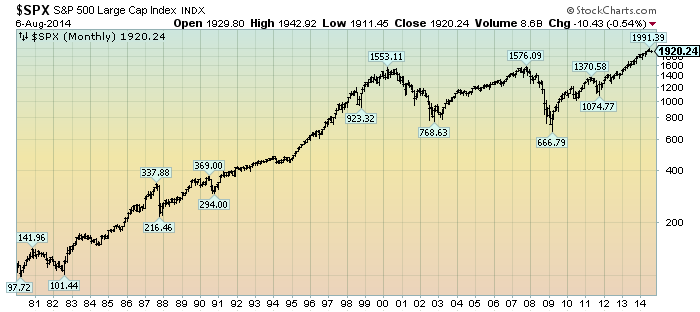Since the Financial Crisis, a variety of reforms have been enacted that will purportedly lessen the possibility of future financial crises, and/or lessen the severity of such crises when and if they occur.
One of these reforms is the new money market rules, and other proposed and enacted initiatives are discussed by Stanley Fischer in the July 10, 2014 speech titled “Financial Sector Reform: How Far Are We?”
I’ve discussed vulnerabilities in the financial system in various posts, including the September 18, 2013 post titled “Has The Financial System Strengthened Since The Financial Crisis?” My analyses continue to indicate that (in aggregate) the steps taken to reduce the possibility of future financial crises will not be effective in lessening or eliminating the next financial crisis; nor will they serve to alleviate the crisis when it happens.
I believe a key part of the next financial crisis will be another crash. There are many reasons I believe this next crash is of such vital importance. Among these reasons are:
- The next crash will be enormous when viewed from a (ultra) long-term historical perspective
- The next crash will lead to economic weakness that will constitute what I refer to as a Super Depression – i.e. an economy characterized by deeply embedded, highly complex, and difficult-to-solve problems
I have regularly commented upon the building level of financial danger. There are a broad array of underlying problems inherent in today's financial system. While much recognition is afforded to the various aspects of economic growth that have occurred, lesser or no recognition is given to the existence and propagation of these various problematical issues.
My analyses continue to indicate that one of the primary issues in this building level of financial danger is the widespread nature and enormous magnitude of asset bubbles. These bubbles and their dissolutions will have profound adverse future economic implications. Many will realize that this is in direct contrast to the views held by many – including various top policy makers – that such bubbles do not presently exist. [Alternately, many others dismiss the danger of bubbles, citing many different rationales, perhaps chief among them that the vast equity bubble(s) of the late 1990s did not lead to substantial adverse economic impact.]
Another issue that deserves greater recognition is the financial wherewithal of a large percentage of American citizens. Recent studies and other statistics portray a current situation in which a widespread “paycheck to paycheck” situation exists, and thus any additional prolonged and/or significant economic weakness will likely present inordinate financial hardships to those in this situation. As well, recent studies (including the Russell Sage Foundation's "Wealth Levels, Wealth Inequality, and The Great Recession"(pdf)) regarding individuals’ net worth portray many deeply disconcerting aspects concerning net worth levels and trends.
While no one likes to contemplate a future rife with economic adversity, current and future economic problems must be properly recognized and rectified if any true long-term economic vitality is to be realized.
For reference purposes, here is a monthly chart of the S&P500 since 1980, depicted on a log scale with price labels:
(click on chart to enlarge image)(chart courtesy of StockCharts.com; chart creation and annotation by the author)
_____
The Special Note summarizes my overall thoughts about our economic situation
SPX at 1920.24 as this post is written

No comments:
Post a Comment